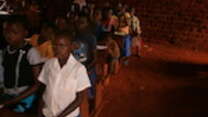This April, the International Rescue Committee celebrates the successful completion of nearly three years of educational programming in the West Bank of the Palestinian Territories.
Our partnership with the ministry of Education and Higher Education, which has established a strong foundation for future educational efforts, equipped teachers and administrators with the knowledge and skills to ensure safe learning environments, promote nonviolence, and encourage positive behaviour.
The IRC first became involved in education in the West Bank through Bidna Capoeira, an international charity based in the United Kingdom that trains children in the art of capoeira, a combination of dance, sport and music intended to promote physical and social well-being.
While working with Bidna Capoeira, we conducted an education assessment that found academics were in decline in the West Bank, an area with a well-deserved reputation for quality education.

As many of the children surveyed had endured physical or emotional trauma, the report concluded that such experiences affected their ability to learn. The IRC advised changes in both instructional methods and classroom climate to address their needs.
With the support of a dedicated donor, the IRC established a comprehensive professional development programme for teachers and principals based on the IRC’s Healing Classrooms methodology used in many of the 40 countries where we work.
Healing Classrooms aims to ensure that children affected by conflict have access to quality literacy instruction in protective environments.
Incorporating best practices developed by New York City's Tanenbaum Center for Interreligious Understanding, a secular nonprofit organisation that combats prejudice in schools, workplaces, health care institutions, and areas of armed conflict, “Learning to Read in Healing Classrooms” worked to ensure that children develop foundational literacy and are able to expand opportunities to learn through reading.

To this end, the IRC delivered 4,000 English and Arabic books to 20 participating primary schools in Ramallah District, and instructed teachers in the skills and knowledge necessary to create safe spaces for learning.
“The training helped me improve my teaching techniques,” said one English teacher. “Now my students are able to participate in the learning process, not just receive information.” Another teacher mentioned that, because her students help design classroom rules, they are more motivated to abide by them. “I’ve started motivating my students to think in creative ways and to participate more in class,” she said.
Their supervisor echoed their sentiments. “Teachers have been encouraged to ask difficult questions about time constraints, individual differences among students, and alternative teaching methods, as well as students' well-being.”
In total, Learning to Read in Healing Classrooms directly reached 7,000 students and 65 teachers in the West Bank. The IRC is proud to have provided a model and materials that will continue to improve the lives of Palestinian children.



